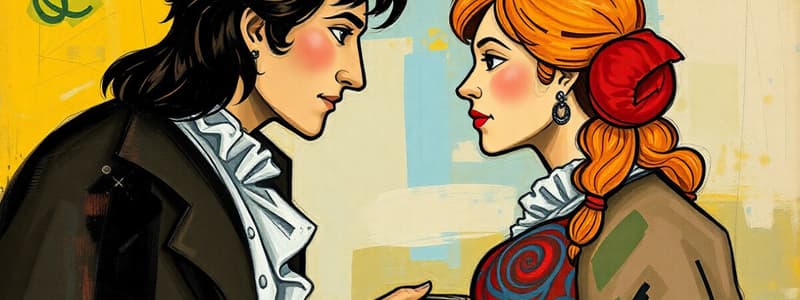Podcast
Questions and Answers
What is the main reason Busy indulges in swine's flesh?
What is the main reason Busy indulges in swine's flesh?
- He genuinely enjoys the taste of pork.
- He seeks to impress other fair-goers.
- It is a tradition at the fair.
- To mock the Jewish faith and elevate Christianity. (correct)
What motivates Adam Overdo to disguise himself as a fool?
What motivates Adam Overdo to disguise himself as a fool?
- To entertain the fair-goers.
- To gather truthful information for law enforcement. (correct)
- To participate in the festivities anonymously.
- To challenge his authority.
How does Mooncalf's remark about Edgworth's quick hand reveal his character?
How does Mooncalf's remark about Edgworth's quick hand reveal his character?
- It exposes his discontent with Overdo's authority.
- It shows he admires the artistry of writing.
- It suggests he respects Edgworth as a writer.
- It indicates his cleverness and understanding of deceit. (correct)
What realization does Adam Overdo come to about compassion?
What realization does Adam Overdo come to about compassion?
What unique perspective does Dame Purecraft offer about Trouble-All's behavior?
What unique perspective does Dame Purecraft offer about Trouble-All's behavior?
In what way does Quarlous's character serve as a voice of reason?
In what way does Quarlous's character serve as a voice of reason?
What does the character of Busy primarily illustrate through his actions?
What does the character of Busy primarily illustrate through his actions?
What aspect of Overdo's character becomes evident through his experiences at the fair?
What aspect of Overdo's character becomes evident through his experiences at the fair?
What does the phrase, 'The world is mad in error, but he is mad in truth,' suggest about societal perceptions?
What does the phrase, 'The world is mad in error, but he is mad in truth,' suggest about societal perceptions?
What does Littlewit lament about Master Cokes in the opening monologue?
What does Littlewit lament about Master Cokes in the opening monologue?
What significant characteristic does Quarlous exhibit despite his foolish behavior?
What significant characteristic does Quarlous exhibit despite his foolish behavior?
How does Littlewit feel about confronting Wasp?
How does Littlewit feel about confronting Wasp?
Which character does Quarlous describe as being more concerned with his reputation than his faith?
Which character does Quarlous describe as being more concerned with his reputation than his faith?
What does the name 'Wasp' signify about the character's personality?
What does the name 'Wasp' signify about the character's personality?
What tone does Littlewit convey in his opening monologue?
What tone does Littlewit convey in his opening monologue?
What activity is Quarlous indulging in while discussing Littlewit’s wife?
What activity is Quarlous indulging in while discussing Littlewit’s wife?
What does the character name 'Overdo' suggest about that character?
What does the character name 'Overdo' suggest about that character?
What aspect of Quarlous' personality does his affection for folly reveal?
What aspect of Quarlous' personality does his affection for folly reveal?
What does Quarlous imply about Busy by mentioning his 'face'?
What does Quarlous imply about Busy by mentioning his 'face'?
Flashcards are hidden until you start studying
Study Notes
Characters and Relationships
- Littlewit: A nervous and frantic character who is desperate to marry off his mother-in-law to someone wealthy. He is a friend of both Quarlous and Cokes. He admires and fears Wasp.
- Quarlous: A man of loose morals and pleasure, he has a cynical view of the world and enjoys playing the fool.
- Wasp: A hot-tempered individual whom Littlewit fears and warns Quarlous to avoid. His name suggests his aggressive nature.
- Zeal-of-the-Land Busy: A hypocritical Puritan who condemns sin while indulging in the pleasures of the fair. He is preoccupied with his own "face" rather than genuine faith.
- Adam Overdo: A justice of the peace who adopts a disguise to observe the fair and enforce the law more effectively. He ultimately learns the value of compassion in his role.
- Mooncalf: A barman at Ursla's who is keenly observant of the fair-goers' behavior, despite being considered foolish or low-ranking. He speaks in riddles and seems to understand the complexities of the fair.
Themes
- Hypocrisy: The play exposes the hypocrisy of characters like Zeal-of-the-Land Busy, who claim to be virtuous while indulging in vice.
- Disguise and Deceit: Characters adopt disguises to deceive others and manipulate situations, highlighting the theme of appearance versus reality. Overdo's attempt to go undercover as a fool is a prime example.
- Social Commentary: The play critiques the follies and vices of Elizabethan society, including the pursuit of wealth, sexual immorality, and the misuse of authority.
Key Quotes with Context
- "One that stands upon his face, more than his faith, at all times." - Quarlous's description of Zeal-of-the-Land Busy exposes Busy's hypocritical nature, emphasizing his focus on public image rather than true faith.
- "By the public eating of swine's flesh, to profess our hate and loathing of Judaism." - Busy's self-serving rationalization for indulging in pork at the fair, highlighting his hypocrisy and exploitation of religious differences.
- "We hear with other men's ears; we see with other men's eyes." - Overdo's frustration with relying on others for information, leading him to adopt his disguise, revealing his desire for direct and personal investigation.
- "A very quick hand, sir." - Mooncalf's witty observation about Edgworth being a pickpocket, exposing the limitations of Overdo's perception and highlighting the barman's sharp understanding of fair-goers' actions.
- "I see compassion may become a Justice, though it be a weakness." – Overdo's realization of the value of compassion after experiencing hardship at the fair, suggesting a shift from rigid judgment to a more empathetic approach.
- "The world is mad in error, but he is mad in truth." - Dame Purecraft's insight into Trouble-All's perceived madness, questioning the validity of social norms and suggesting that genuine truth can sometimes appear as madness.
- "Sir, why do you not go on with the enormity?" - Quarlous's playful mockery of Overdo's failed pursuit of justice, highlighting the ironies of the play and suggesting Overdo may have become part of the "enormity" he seeks to expose.
Studying That Suits You
Use AI to generate personalized quizzes and flashcards to suit your learning preferences.



